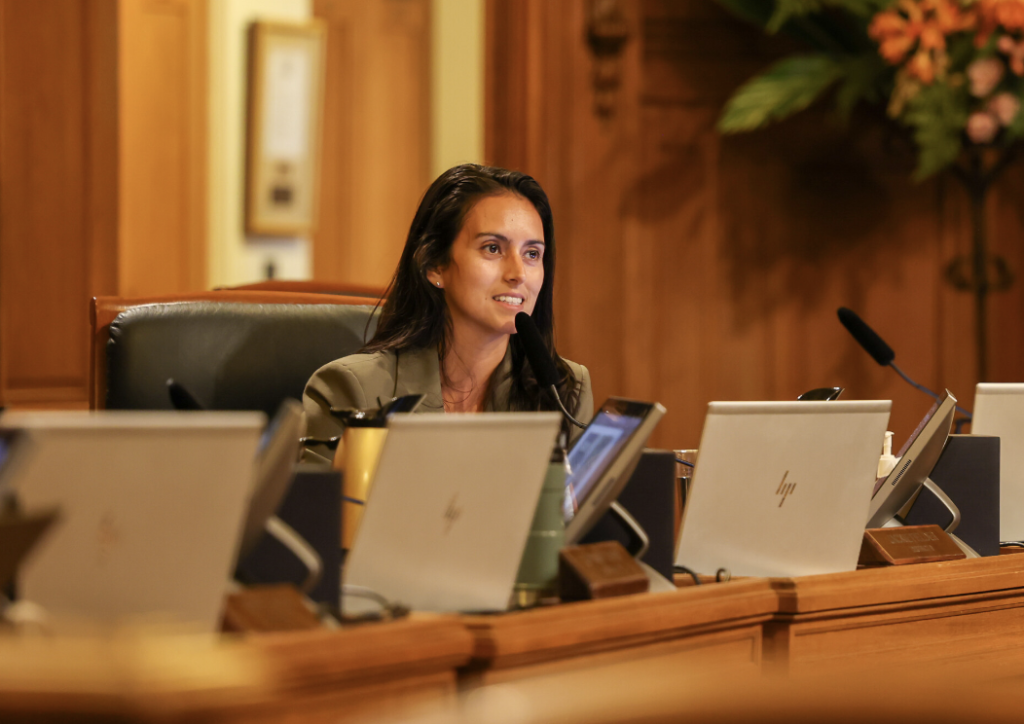The San Francisco supes in 2021 and then the voters in 2022 approved limits on fundraising appeals from city officials for very good reasons. When elected officials or department heads can ask companies that do business with the city to donate to favored projects, there’s immense potential for corruption. It’s happened numerous times.
Officials can still call up their rich pals and big corporations and ask for donations—if they get a waiver from the Board of Supes. By law, those officials have to explain who they intent to solicit, and why that might create a conflict of interest.

So the Mayor’s Office sent a representative to the Government Audit and Oversight Committee Thursday to ask for a blanket waiver for any money solicited for “downtown revitalization”—but she was unable to answer even the most basic questions from Committee Chair Jackie Fielder.
Still, the two conservative men on the committee, Sups. Steven Sherrill and Danny Sauter, overruled Fielder and approved the waiver anyway.
It was pretty stunning: Crezia Tano, chief operating officer (when did that private-sector title became a city position?) of the Office of Economic and Workforce Development, could explain almost nothing about who the mayor might call, what other interests they might have, or how their participation in a downtown development fund might create a conflict.
Some of the key moments:
Fielder: “Will the waiver be used to fundraise to support the recovery of all of San Francisco? Our small businesses, especially in the Mission, Potrero and Bernal where I represent, are still very much struggling, as you know. So to see an eye-popping number like $6.2 million being raised for downtown while we also are standing up a small business fund to support any displacement with respect to the family zoning plan that yet has to be funded, I’m just wondering what support is being garnered for other neighborhoods outside downtown.”
Tano: “The legislation does aim at revising revitalizing the entirety of the city but with a primary focus on downtown.”
Fielder: “To my understanding, the only entity that received funding under this initial waiver was the Capital for Good for downtown development corp. Is that correct?
Tano: “At this point in time, yes.”
Fielder: “Are there other third parties other than that entity that the mayor will be making payments to?”
Tano: “I would love to set up a briefing with the mayor’s staff. They are far more engaged on the larger strategy for fundraising, and we’d be happy to sit down with you and your staff to go over that.”
Fielder: “It’s not just for me, it’s for the public record.”
Fielder: “Can you identify all the specific interested parties that were solicited under the previous waiver?”
Tano: I don’t have that information on hand right now.
Fielder said she had asked for that information in advance and requested that the Mayor’s Office send someone who would be able to answer the question.
Among the entities that gave the mayor money in the last round: The Conway Family Foundation, Shorenstein Realty Services, and Ripple Labs.
Ron Conway has long had desires on political power in San Francisco, and has all sorts of potential conflicts. Shorenstein owns a ton of downtown buildings. Ripple Labs is already closely linked to the SF police and the local surveillance state.
Fielder: “Does the Mayor’s Office believe any of these are potentially interested parties?”
Tano: “If they have given in the past they are definately a prospect for the future.”
Fielder: “Does the Mayor’s Office believe that there are any other entities or persons solicited under the initial blessed payments waiver that have not yet been reflected in the mayor’s [behested payments] filings?
Tano: “It’s my understand that the ethics secretary does abide by the reporting of the form 803 within the 30 day reporting period so there very well could have been more recent donations under the behest of payment waiver that just haven’t been filed.”
Fielder: “How are we supposed to sign off on the statement in this new waiver that these behested payments do not create an appearance of impropriety if we don’t even know if they’re interested parties?”
Tano: “I believe that revitalizing our downtown is a core initiative of San Francisco’s economic vitality and I cannot speak to the impropriety.”
Fielder asked if the Mayor’s Office could commit to providing the information before the item goes to the full board; Tano: “I can commit to looking into it.”
Fielder moved to continue the item to the call of the chair—that is, when the Mayor’s Office comes forward with the information the supes need to make a decision.
Then Sauter and Sherrill, playing Tweedledum and Tweedldee, said that sure, Fielder had raised some good questions. But gee: Revitalizing downtown was too important to delay, even for a week, the critical task of letting the mayor and his staff shake down rich people who might do business with the city for money to fund downtown.
Now it goes to the full board.




